

15 Writing Prompts about being Brave
Staring at a blank page can be daunting. It doesn’t matter if it’s an old school notepad or a shiny computer screen.
The simple act of capturing that first word, sentence, and paragraph can take an amazing amount of fortitude and courage.
Being brave doesn’t mean making a fist, it is about having the moral courage to stand up for what is right, what is just. Bravery means having the mental toughness to persevere, to go forward, to face the unknown.
How To Use Prompts To Jumpstart Your Writing
Below is a list of writing prompts to get your creative brain churning.
These prompts are meant to give you a kernel of an idea and start your first sentence. The first act of bravery is writing the first word of your story.
Choose a starter and add your thoughts. Let the words flow, the flow will take you far in your writing journey. Forget about punctuation, spelling, and grammar — just write — get it down.
Then, when you have a jumble of thoughts written out, go back, edit, rewrite, and edit again. Your story will shine through, and you will take your reader on an exciting journey.
Start Writing About Being Brave
- What will happen if I don’t… We find ourselves in difficult situations where moral conviction meets at a crossroad with following the crowd.
- Can I look myself in the mirror if I… If I take this action, how will I feel tomorrow when I look into my own eyes.
- The first time I said I’m sorry… Apologizing for your actions takes courage, it makes you vulnerable. We know it is the right thing to do, but it is still hard.
- A simple act of kindness led to… Sometimes something as simple as holding the door for someone can be an act of bravery.
- She took a stand against… So many options: bullying, racism, injustice, equality, the list is endless.
- I changed my mind… Stubbornness and stoicism can lock us into a box, breaking free takes courage.
- He followed his heart… This one can take you to an adventure that defies logic.
- I followed my head… Sometimes it takes more courage to not follow your every whim.
- Courage is when… Defined as having moral and mental fortitude.
- He was afraid, but… Facing doubt and conquering fear requires amazing courage.
- I have a plan to… Bravery doesn’t need to be spontaneous, attacking a problem step-by-step gives you conviction and confidence.
- It takes bravery to… Fill in the blank here — speak your mind, stand up for someone, do the right thing, etc.
- My biggest fear is… Define your fear, facing it takes courage, the journey is the story.
- It is hard to imagine a life without… your family, home, friends, love, etc.
- She took one, tiny step… imperfect action and a hero’s desire to reach their goal makes the perfect story.
Every great writer needs ideas; and prompts are the perfect way to get started. Sometimes all we need is a few structured words to get us off and running.
We are dedicated to sharing ideas and resources with fellow writers, teachers, and students.
Our website is chock-full of free resources for your use and to share with friends and colleagues. Sign up for our newsletter to keep up-to-date on what’s happening in the world of writing.
Feel free to contact us and share your ideas for new resources we could provide that would make your creative life easier.
Happy Writing!
Thanks, Matt & Hayley
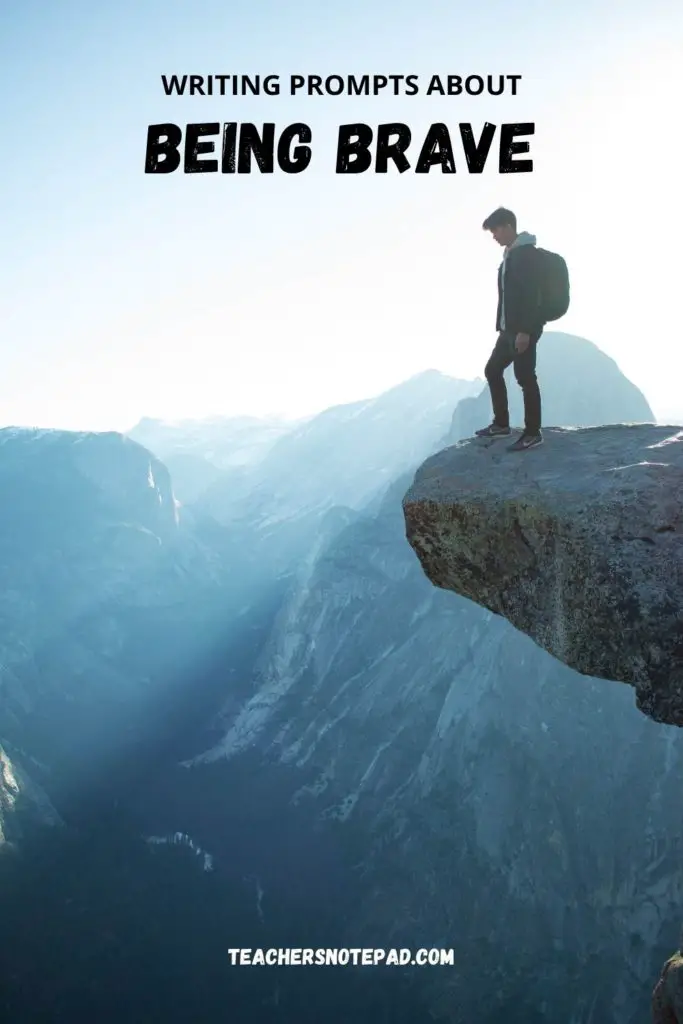

32 Writing Prompts About Courage and Bravery
Stories about courage and trusting your gut are the best! You see them everywhere – in old- school myths , modern movies , you name it.
These stories remind us how to overcome tough stuff, be brave, and how awesome that feels!
So, if you’re into writing, I’ve got some cool prompts for you to play with.
Whether you want ideas for a whole novel, a short story , or just want to get your thoughts down, these questions will help you explore courage and bravery in your own way.
Dive in and let’s get creative !
Writing Prompts About Courage and Bravery
- Reflection on Personal Trials : Consider an event in your life that tested your courage like never before. It could be a crisis, a significant life change , or an unexpected challenge. How did you react to it? Did it alter your perception of bravery? Explore your thoughts and feelings about this moment in your life, focusing on how it forced you to confront and demonstrate your bravery. Write a narrative recounting this event, examining your emotions , reactions, and the aftermath.
- Bravery Through Others’ Eyes : We often perceive ourselves differently from how others perceive us. Think about an incident when someone told you that you were brave, but you didn’t feel brave at the time. Why did they think you were courageous, and why did you disagree? What did this incident teach you about the multiple dimensions of courage? Write a reflective piece exploring this incident and its impact on your understanding of bravery.
- Courage in Everyday Life : Bravery doesn’t always involve grand gestures or life-and- death situations; sometimes, it’s the little things that count. Think of a day-to-day situation where you had to show courage — it could be as simple as speaking up for yourself or someone else, confronting a fear , or taking on a new responsibility . Write a short story about this situation, exploring how it called on your courage and how it changed you.
- Inspiration of Bravery : Everyone has someone they admire for their bravery, whether it’s a real person or a fictional character . Reflect on why you admire this person’s courage and how it influences your own behavior. Are there any aspects of their courage you aspire to emulate? Write an essay analyzing the nature of their courage and how it has inspired you.
- Fear Versus Courage : Fear is a natural part of being human, and true courage often involves confronting and overcoming our fears. Reflect on a fear that you’ve had to face head-on. How did you muster the courage to do so? What were the outcomes, and how did this experience shape your perception of bravery? Write a personal essay on this fear, your process of overcoming it, and its impact on your concept of bravery.
- The Cost of Courage : Bravery can sometimes come at a price. There could be times when standing up for what you believe in led to loss or difficulty. Reflect on such a time and how you dealt with the consequences. Did it make you question your actions, or did it strengthen your resolve? Write a narrative detailing this experience and its effect on your understanding of courage.
- Unexpected Acts of Courage : There are moments when we surprise ourselves by acting bravely in unexpected circumstances. Recall such a moment when your actions surprised you. What led you to act courageously, and what was the outcome? How did this incident affect your understanding of your own courage? Write a reflective piece describing this event and its impact on your self-perception.
- Bravery in Leading : Being a leader often requires courage, as it involves making difficult decisions, facing criticism, and setting an example for others. Reflect on a time when you had to step up and lead, whether in a small group or a larger community . How did you show bravery in this role ? What challenges did you face, and how did you overcome them? Write an account of your leadership experience, focusing on the role courage played in it.
- Silent Bravery : There are moments of quiet courage that often go unnoticed – standing up to a personal bias, reaching out to someone despite past misunderstandings, or persisting in the face of consistent failure . Reflect on a moment of such silent bravery in your life. How did it transform you, and what did it teach you about the nuances of courage? Write a personal narrative focusing on this silent act of bravery and its impact on your personal growth .
- Unconventional Acts of Courage : Society has defined sets of expectations and norms. Breaking away from these norms and being true to yourself often requires a lot of courage. Think about an instance when you displayed bravery by defying societal expectations to stay true to your convictions. Write a reflective piece on this incident, exploring your struggle, triumph, and lessons learned.
- Bravery in Vulnerability : Showing vulnerability, opening up about our feelings, and seeking help can be some of the bravest acts. Reflect on a time when you had to open up about something deeply personal and how it demanded courage from you. How did it affect your relationships and your perception of strength and courage? Write a memoir -style piece about this event and its lasting effects on you.
- Cultivating Courage : Bravery isn’t an inborn trait; it can be cultivated over time. Reflect on your journey of cultivating courage. How did you recognize the need for it? What actions did you take, and how did you overcome setbacks? What were some significant milestones along this journey? Write an essay detailing your journey of cultivating courage, emphasizing the growth process.
- Empathy and Courage : Empathy often requires courage as it involves understanding and sharing the feelings of others, which can sometimes be painful or uncomfortable. Reflect on a time when your empathy for someone else’s situation led you to act courageously. Write a narrative exploring how empathy propelled you into an act of courage and how this event influenced your perception of bravery.
- Bravery in Forgiveness : It requires immense courage to forgive, especially when the hurt is deep . Reflect on an experience where you demonstrated courage by choosing to forgive. How difficult was it to take this step? How did this act of bravery affect you and the other person involved? Write an introspective piece examining this act of forgiveness and its impact on your understanding of courage.
- Sacrificial Courage : There are moments when we display bravery by making sacrifices for the benefit of others. Recall an instance when you had to make a significant sacrifice that required courage. What were the consequences, and how did they affect your outlook on bravery? Write a narrative detailing this sacrificial act and its influence on your perception of bravery.
- Overcoming Physical Limitations : Often, we find courage within ourselves when dealing with physical limitations or illnesses. Reflect on a time when you or someone close to you showed courage in the face of physical adversity . How did this situation highlight the essence of bravery for you? Write a personal essay on this experience, focusing on how it shaped your view of courage.
Story Ideas About Courage and Bravery
- A small-town firefighter battling a citywide fire: Imagine a small town where everyone knows everyone else, and a dangerous fire breaks out, threatening to consume it all. Your main character is a local firefighter who is under-equipped but brimming with courage. The story should focus on their determination and the risks they take, exposing their bravery under intense circumstances. Write about how they rise to this daunting challenge, leveraging their deep connection with the community and their extraordinary courage.
- Stand against a corrupt regime: Picture a world where your protagonist lives under a tyrannical government. Despite the risks associated with dissent, they decide to take a stand against the regime. Their actions start small but gradually gain momentum, leading to unforeseen consequences. Delve into the story of their bravery, illustrating the courage it takes to stand against systemic corruption.
- An encounter with a wild animal : Your character is an average person who stumbles upon a potentially dangerous wild animal while hiking in a remote area. With no one else around to help, they must rely on their courage to manage the situation. Write a thrilling account of how their bravery plays a pivotal role in their survival .
- Facing terminal illness: Your protagonist is diagnosed with a terminal illness. Instead of letting the diagnosis rule their remaining days, they decide to face it with courage, living life to the fullest. Tell their heart-wrenching tale of bravery, depicting how they inspire others around them with their optimistic outlook and courageous spirit .
- The reluctant hero : Your main character is an everyday person who is unwillingly thrust into a crisis situation, such as a hostage situation, natural disaster , or act of terrorism. They must summon their courage and step out of their comfort zone to navigate this life-threatening situation. Craft a compelling narrative that explores their journey from reluctance to bravery.
- Revealing a personal truth: The protagonist holds a secret related to their identity , such as their sexual orientation or a hidden past, which, if revealed, could ostracize them from their conservative community. They decide to come out with the truth, despite the societal backlash. Write about their brave journey of self-acceptance and the courage to live authentically.
- An unexpected hero: Imagine a timid, introverted character who everyone overlooks. However, when a crisis arises, they surprise everyone by demonstrating unprecedented courage. Spin a tale that unfolds their transformation from an underdog to a hero, highlighting their journey of courage and self-discovery .
- Protecting a loved one at all costs: Your character is a pacifist who abhors violence . But when a loved one is in danger, they are forced to step into a violent confrontation to save them. Narrate this intense story of love-induced bravery, where the character must face their fears and take action they would never have imagined.
- Overcoming Fear of Public Speaking: Your protagonist suffers from a severe fear of public speaking, yet finds themselves having to deliver a speech at an important event. The story should focus on the mental and emotional preparation leading up to the event. Explore their journey of summoning courage to overcome their fear and bravely face the audience.
- Choosing a Difficult Career Path: Your character is passionate about a career path that is notoriously difficult and fraught with failure. Despite the odds, they choose to pursue it, navigating obstacles with relentless determination and courage. Write about their courageous choice and how their unwavering bravery propels them towards their dream .
- A Nurse During a Pandemic: Imagine your protagonist as a nurse working in a hospital during a global pandemic. Faced with uncertainty and danger, they show immense courage in tending to the sick. Narrate the stories of their brave acts in the face of life-threatening risk, painting a vivid picture of their everyday courage.
- Championing Environmental Conservation: The protagonist is an environmental activist in a region where ecological concerns are sidelined by economic interests. Despite threats and backlash, they dare to stand up for the environment. Tell their story, showcasing their courage to fight against powerful adversaries for the cause they believe in.
- The Unlikely Athlete: Your character has a physical disability , yet they have the courage to train and compete as an athlete. Craft an inspiring narrative highlighting their bravery and determination to overcome their physical limitations and societal stereotypes.
- Refugee ’s Journey to Safety: Your protagonist is a refugee forced to flee their home due to conflict or persecution. Their journey to safety is fraught with danger, but they bravely push forward, holding onto hope . Depict their harrowing journey, emphasizing their bravery in the face of unimaginable adversity.
- Teacher in a Struggling School District: Your main character is a teacher in an underfunded and underperforming school. Despite the challenges, they take innovative measures to ensure their students get quality education . Detail their story of courageous dedication to their students and their brave fight against the systemic challenges of their environment.
- Against Bullying : The protagonist is a high-school student witnessing daily bullying incidents in their school. Instead of staying silent, they decide to stand up against the bullies, despite the fear of becoming a target. Write about their acts of courage, demonstrating how their bravery helps to change the bullying culture in their school.
Founder and Chief Content Curator @ Digital Phrases
I'm a writer, words are my superpower, and storytelling is my kryptonite.

A Thorough Review of the Brave Writer Curriculum for Literature
Before I found the Brave Writer Curriculum, I felt like Tarzan. Or Jane. Swinging all day from various trees in the language arts forest, never knowing if it was going to be enough.
I was leaping from workbook to workbook to cover these skills, but what was I achieving? Spelling. Vocabulary. Comprehension questions. Grammar. Writing. Would my kids ever connect all of these branches?
All of the Language arts skills felt so jumpy and disconnected in our homeschool. And I was tired. I didn’t want to swing like Tarzan from topic to topic anymore, but I wasn’t sure what else to do.
So I did what any homeschool mom does. I googled. And I googled. And I googled. I knew I could find a program that would help me teach Language Arts as a cohesive set of skills for communication . I knew I could find a guide to take us into the world of language and communication.
And I stumbled upon the Brave Writer Curriculum for homeschooling families and I decided to give it a try.

{This post contains affiliate links. Read my full disclosure .}
Understanding Language Arts and the Brave Writer Curriculum
Language Arts is a broad term used to describe the variety of skills included in the subject areas of speaking, listening, reading and writing. Language Arts includes many of the following skills:
reading/phonics literature comprehension/analysis grammar punctuation handwriting formal and informal writing spelling vocabulary speaking listening …and more
As a homeschooling parent, teaching all of these skills to several different children each day felt quite overwhelming. I was desperate to find an easier way, and the Brave Writer curriculum became the solution.
But first, let’s take a look at the problem I was experiencing.
My Homeschool Experience Teaching Language Arts
Picture the subject of language arts skills as a lush forest of trees. Using various workbooks with my kids made me feel like I was leaping around the Language Arts forest all day, swinging from tree to tree to tree.
To make teaching language arts even more complicated, I have four children. That means that all four of my children were working in different workbooks so they could work on material at their grade level. That was a lot of jumping around without much family cohesiveness. There was no joy in a day that felt so jumpy and checklist-y.
Things needed to change, so in a moment of inspiration and a little bit of desperation, I decided to purchase the literature guides from the Brave Writer curriculum. The guides promised to walk us through the forest of language arts together, using ONE literature title for the whole family.

Using the Brave Writer Curriculum
Once our family decided to take the plunge and begin using the Brave Writer curriculum, we started with the literature guides . These guides made it easy to teach a variety of language arts skills to all of my kids.
The Arrow and Boomerang guides include spelling, grammar, and vocabulary instruction through copywork in addition to discussion questions to help develop comprehension and analysis skills.
Getting Started as a Family
When we began our first Arrow guide as a family, a path through the language arts forest began to appear. Suddenly, I was walking through our daily language arts instruction with all four of my children. Together. Hand in hand. I was no longer swinging from tree to tree with each individual child.

–> Grab Your Crossover Book Club Guide <–
Everyone was working, learning, and discussing literature together and I suddenly felt sane.
Each month, we read one title together as a family and that title became our path through the language arts forest. The Brave Writer Curriculum became our trail guide, directing us to the various “trees of Language Arts” along the way.
Brave Writer Curriculum Guide Overview
Our family began our literature studies using the Brave Writer Arrow Guides. We used one guide a month and followed the four-week plan for each book. The Brave Writer Arrow and Boomerang Guides are each divided into four weeks of instruction. Each week contains:
1. Weekly Copywork
The copywork passages serve as the basis for grammar, vocabulary, and spelling instruction. Sometimes there is more information provided to talk about literary elements being used in the passage as well, such as similies, hyperbole, and more.
Each passage is accompanied by teacher notes to guide your instruction. These notes contain tips and details for parents so they can effectively use the passage as a teaching tool for grammar, punctuation, spelling, and literary style.
2. A Literary Element
Each literature guide in the Brave Writer curriculum focuses on a single literary element based on the content of the book. An explanation of the element as well as suggestions for discussion, writing, and teaching activities are included in the guide. Occasionally other literary elements and writing techniques are mentioned as part of the copywork instruction.
3. A Writing Activity
The writing activities each month are included as a way to expand your child’s understanding of the literary element. Some are short and simple while others are a bit more involved. The best part is that you can elaborate and dive deeper into any of the projects if your kids are really enjoying them.
4. Big, Juicy Questions
Nine Big, Juicy, Questions are included to help facilitate a discussion with your children about the book. These questions are excellent for a family discussion or as part of a kid’s book club , which is how I used them for many years.
5. Book Club Ideas
The final section of the guide contains food, game, and activity ideas for a themed book club. If you read this blog, you know that I love a themed book club. You can find several of my themed book club ideas on this blog as examples of how you can implement these ideas.

These guides assist homeschooling parents each month so you can use one book title to teach language arts skills to all of your children. Over time, you will continue to build a wonderful foundation of knowledge for future literary analysis while developing the mechanics of writing.
Implementing the Brave Writer Curriculum
It takes little trial and error but every family will find their own groove with the Brave Writer literature guides. For many parents, they can be very confusing at first because they don’t have a daily schedule included. Instead, there is information included for each week and it is up to a parent to determine the best way to use the copywork and content.
I have previously shared our weekly schedule but will provide a general overview here. If you need more detail then you can check out how we implement the guide day to day:
–> How We Implement the Brave Writer Arrow Guides <–
Our family uses one literature guide each month. We read the book together as a family and implement the copywork and language arts during the week.
I introduce the copywork on Monday and we discuss the passage. My kids begin copying the passage on Monday, but if the passage is long, my kids might take another day or two to finish the lesson. Sometimes they practice writing a particular word or two a few times if it was difficult.
We continue the lessons and conversations during the week though the bulk of my instruction is completed on Wednesday. If I want to use the passage for dictation, then I will typically dictate all or part of the passage on Thursday or Friday.
A Detailed Look at Week One with the Brave Writer Arrow
I also shared a very detailed walk-thru of the Brave Writer curriculum guide to “The Lion, the Witch, and the Wardrobe” on my YouTube channel . Here is a look at week one:
Does the Brave Writer Curriculum work to Teach Language Arts?
Short answer…yes.
Longer answer…I have seen enormous growth in my kids’ understanding of literature and their ability to discuss it in a thoughtful manner. They continue to make progress in spelling and grammar. This is all happening through a planned exposure to a variety of literary genres.
Best of all, our family has created bonds through reading about memorable characters, hysterical situations, and heart-breaking stories because we were all walking on the same path and using the same trail guide!
Comprehension and Literary Analysis
After several years of using the Arrow and Boomerang Guides, I can affirm that this curriculum has done an excellent job of laying the foundation for high school literary analysis . My children gained skills and knowledge in a “brick by brick” fashion each year and are able to recognize literary elements and concepts.
Brave Writer literature guides offered a wonderful variety of titles over the years so my children were exposed to a variety of voices and genres in their literature. This was very important to me and I was happy with the variety of titles to choose from.

Spelling, vocabulary, and grammar
Honestly, the curriculum laid a wonderful foundation for these areas of language arts, but I found that I felt more comfortable doing a little bit more for both spelling and grammar. That means that sometimes, I returned to a few workbooks to support what we were doing with our Brave Writer curriculum.
Grammar workbooks were one of the tools I turned to occasionally, but I used them differently. If we are studying adjectives in the Arrow Guide, then I might pull a few adjective worksheets from a workbook or website to support our discussion. This allowed everyone to review the same grammar concept so I could continue to focus my energy and lessons. In addition, my kids spent at least one year in middle school learning with a full grammar program to drive home all of the skills in a more systematic fashion.
I also used a spelling curriculum with two of my kids who struggled more with spelling. The other two kids were natural spellers so copywork was enough for them.
We didn’t use any additional workbooks for vocabulary, but many families use Wordly Wise 3000 to help their children develop higher-level vocabulary words. Instead, we used Marie’s Words for vocabulary development . We have such a good time with these vocabulary words that using them and reviewing them doesn’t feel like school work. Best of all, we are all learning and using the same plethora of SAT words.
If you love the Brave Writer curriculum then you will also love:
Live, online book clubs for kids book club discussion questions for any book celebrate a book: themed book club guides how to plan a fun book club for kids.
- Latest Posts
- Homeschooling An Only Child: Everything You Need To Know! - June 18, 2024
- How to Support a Teen Slow Reader - April 25, 2024
- Manatee Summer Discussion Questions and Book Review - April 15, 2024
Similar Posts

Super Fun Card Games the Whole Family Will Enjoy
Save or Share:Family card games are the best! Though let me be clear, our family just loves to play games. Card games. Board games. Video games. We love games of all sorts. But times are changing in this house and my teenagers have outgrown the entertaining games of the early years. And I can’t say…

Practical Ideas for Reading Shakespeare Plays with Kids
Save or Share:Reading Shakespeare’s plays with kids is a fantastic way to lay the foundation so your children can learn to appreciate and enjoy Shakespeare. Unfortunately, the words and the language of Shakespeare’s plays can be intimidating for adults, making it intimidating to introduce the plays to children. Do not let that stop you from tackling this…

Improve Your Homeschool Lifestyle with These Interview Questions
Save or Share:I want our home to be a place where my kids feel free to be themselves. It is my desire that each of my children feel known and celebrated for who they are. When it comes to homeschooling, I want our annual plan to reflect each of my children’s unique set of strengths…
NC Museum of Art: Marks of Genius
Save or Share:Included with your ticket to the Childe Hassam exhibit, currently at the North Carolina Museum of Art, is Marks of a Genius: 100 extraordinary drawings from the Minneapolis Institute of Art. Admittedly, we were not prepared with any background for this exhibit, so I had to wing it with my kids. The exhibit is described…

Over 20 Homeschool Freedoms that Parents often Forget
Save or Share:Most homeschool days follow a typical routine. These semi-predictable routines keep the lessons moving forward and help parents maintain their sanity and this is a good thing. But it’s far too easy to fall into a routine trap and allow things to become boring and mundane if we don’t flex our homeschool freedom…

Most Beautiful, Imaginative Art and Poetry Books Ever
Save or Share:Our family’s favorite modern-day artist is Robert Gonsalves. His mind-bending, beautiful images take us on an exciting trip into the surreal every time we view them. His artwork stimulates our imagination and leaves us wondering how it is created so perfectly. Meet: Rob Gonsalves Rob is a Canadian artist who creates illusions in his…
Great post! Glad these are working for your family
THanks Jamie!
Hi, I have enjoyed reading your review. I have been eyeballing Brave Writer for over a year now and am getting ready to just make a purchase. I have a 9 year old and 7 year old and am wondering if you could recommend an Arrow guide that would be a good one to begin with. Do you also use the Partnership Writing as well?
I have really loved all of the Arrow Guides. The new site now includes more information about literary content, so you might peek around. I own all of the writing programs and we dabble in and out of them. We have also taken some online classes.
Leave a Reply Cancel reply
Your email address will not be published. Required fields are marked *
This site uses Akismet to reduce spam. Learn how your comment data is processed .
- Early Years Curriculum
- Kindergarten Curriculum
- First Grade
- Second Grade
- Third Grade
- Fourth Grade
- Fifth Grade
- Sixth Grade
- US History with Blossom and Root
- Anti-Racism Resources
- Frequently Asked Questions
- Privacy Policy
- Affiliate and Advertising Disclosures
- Terms of Use
- Testimonials
- Updates / Releases
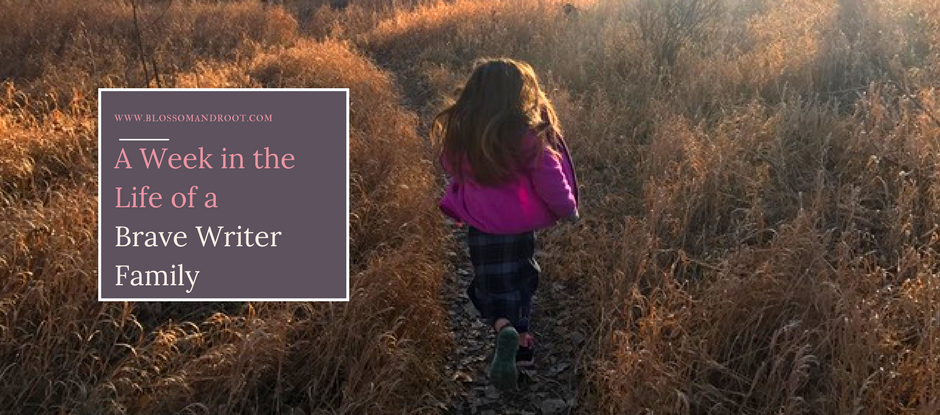
A Week in the Life of a Brave Writer Family
This post may contain affiliate links. please read my disclosure statement for more information..
I’m not really sure which aspect of the Brave Writer lifestyle I fell in love with first. Was it our first poetry teatimes, calling out Shel Silverstein poems over the roar of the jungle rain? Or the permission to devour audiobook after audiobook as we drive through forests and fields together, and call it school? Or was it the idea that the excited words of my tiny daughters as they told me stories were the very first seeds of their writing selves, and that I should catch them on a page like a teacup catching rain, so they could see the significance of their ideas? Or maybe it was the joy of discovering that we could bypass workbooks and instead languish on the beautiful words of the literature we loved together. Or spend a day wandering an art museum with a stack of postcards and learn more than we could in a month of lessons at a desk.
Whatever it was, it’s got us hooked, and if you’ve been reading my blog for some time, you know I’m not shy about saying so. But many of you have asked me what it actually looks like to integrate the Brave Writer lifestyle in our homeschool week. Well, every week is different and that’s what I love about it. But there are elements that we incorporate regularly–some daily, some weekly, some when inspiration strikes.
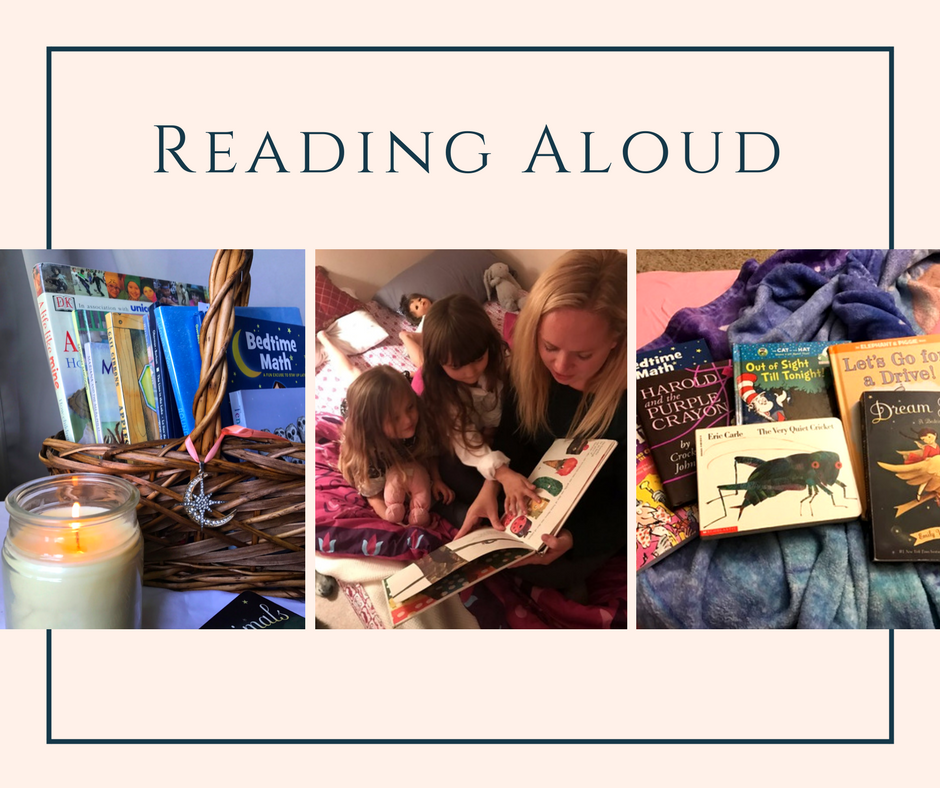
Reading Aloud
Reading aloud is a daily affair. It’s built into the rhythm of our mornings and nights together. We snuggle on the couch to read from our morning basket–a mix of fiction and non-fiction, from nature lore and Shakespeare to biography and poetry to Louisa May Alcott and Laura Ingalls Wilder. We also do a “bedtime basket.” This basket always starts with Life of Fred, then my oldest reads from Frog and Toad or Little Bear (or something similar) and we end with selections from the library. Reading aloud is the essential foundation of the Brave Writer lifestyle, and the easiest to implement. Yes, audiobooks count, which we love because we do put in a lot of miles. We’ve listened to hundreds of hours of audiobooks on the road–from Pippi to Jo, from Anne to Matilda, and the entire Ramona series at least four times.
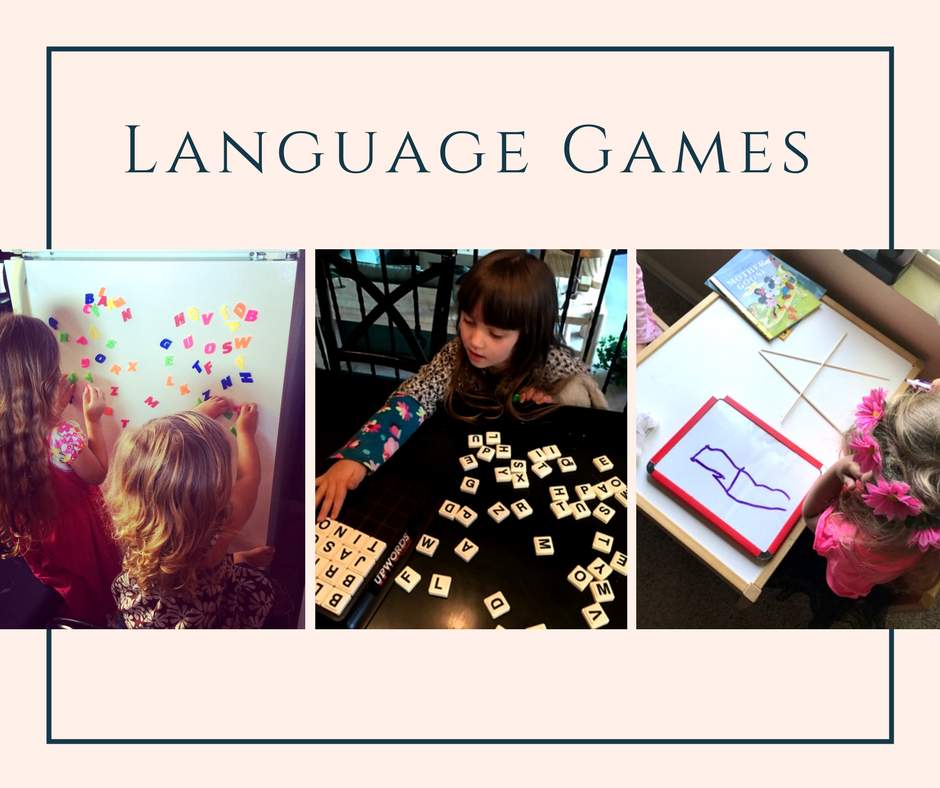
Language Games
I love gameschooling, and look for every opportunity to insert games into our homeschool life. We play many games that center around language, as well as math, geography, herbs and plants, nature, and science. The current favorites are Bananagrams, Jr. and Wildcraft. Games happen about twice a week, after morning basket.
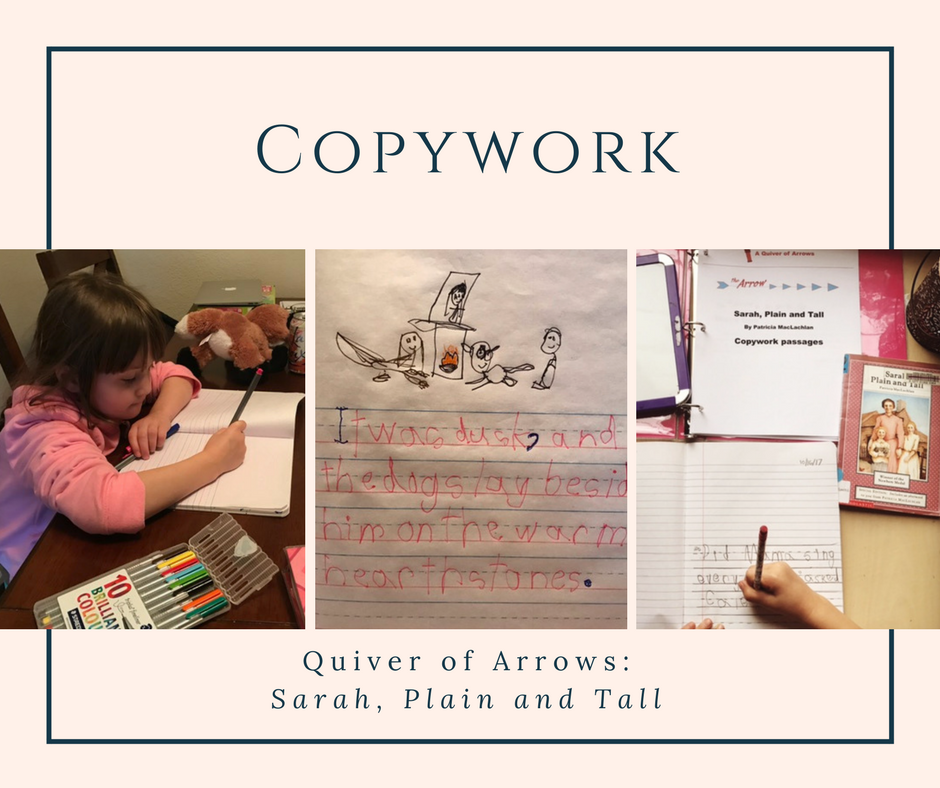
Copywork, Dictation, and Literary Elements
Like most people who have studied Charlotte Mason, I truly believe that copywork and dictation are incredibly effective ways to teach grammar, writing structure, handwriting, spelling, literary elements, and more. But the Brave Writer curriculum we use, Quiver of Arrows , takes this one step further by using beautiful and inspiring works of literature as the material for it. For example, we are nearly finished with the Quiver issue for Sarah, Plain and Tall . We’ve learned about the structure of letter-writing and the power of descriptive color words, and practiced printing beautifully, all while enjoying a lovely story together. Next week, we’re going to have a letter-writing party to celebrate the end of this issue. Each one takes approximately four weeks (five if we add a party or special activity at the end.) Typically, our copywork selection takes one to two days per week, and our dictation takes one day. The writing project, which investigates a specific literary element, takes an additional day on the fourth week only.
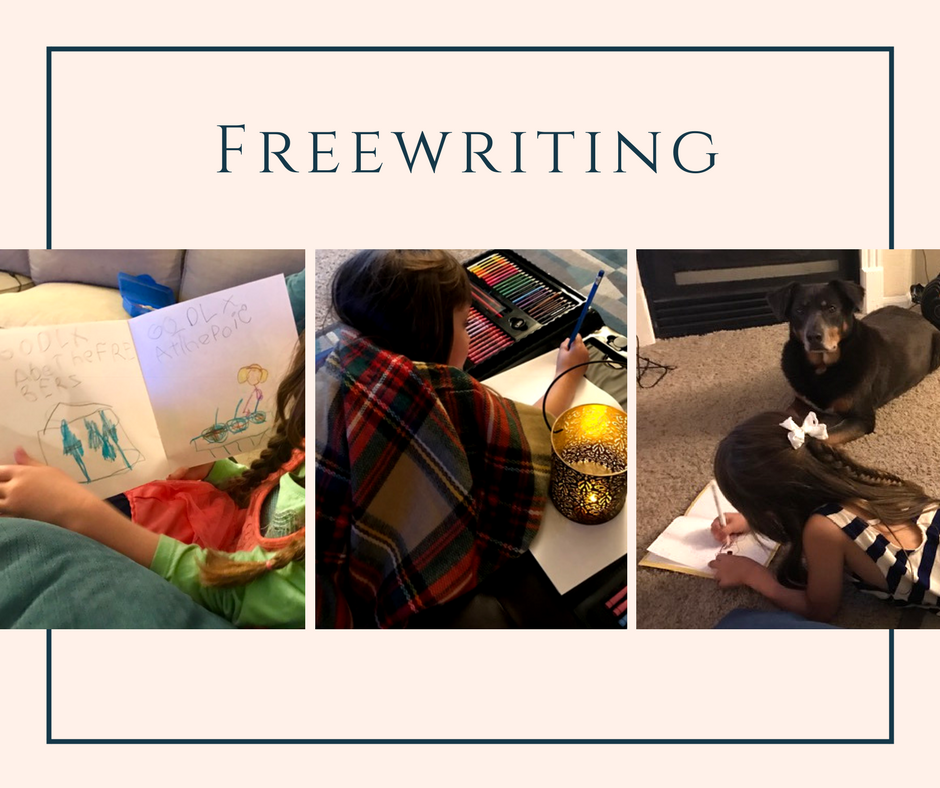
Freewriting
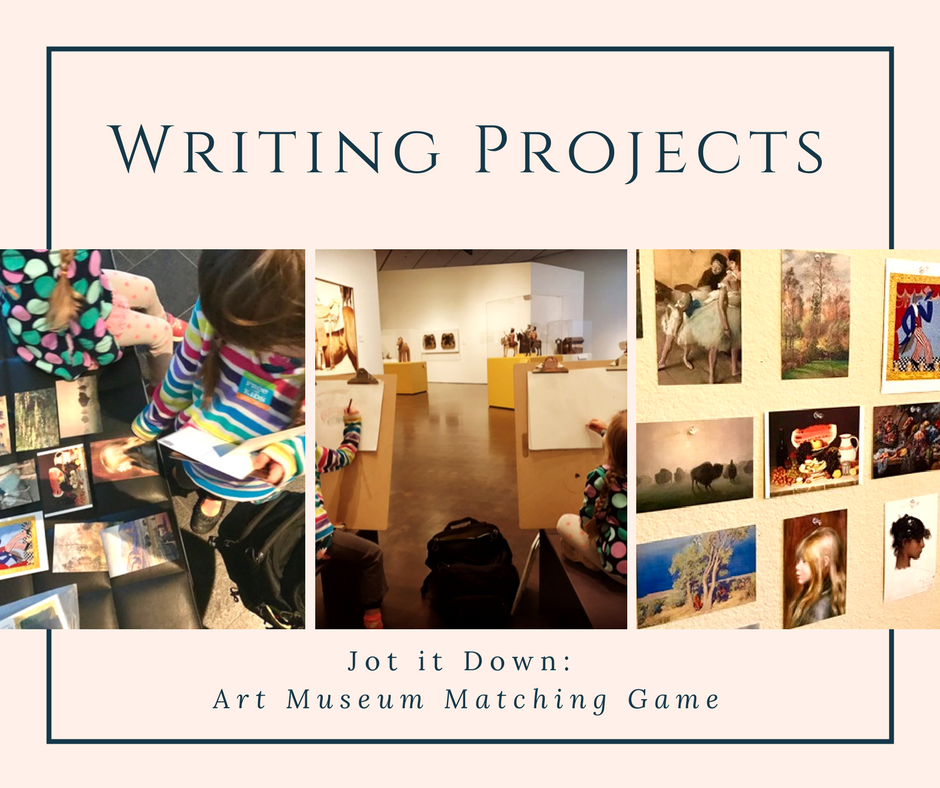
Writing Projects with Jot It Down
I remember when I first ordered Jot It Down , our writing curriculum from Brave Writer. I saw the ten writing projects and thought “oh no, this will only get us through one year.” I laugh now to think of that. 🙂 The beauty of Jot It Down , and the other writing programs from Brave Writer, is that they supply an endless framework for rich, inviting projects for you and your child. We are now in our second year of Jot It Down projects, with no sign of slowing down. We’ve made books of fairy tales, books about our favorite animals and planets, spent hours and hours in art museums, made a poster about isopods, and created a photo album of our favorite memories with our family members. We usually complete one project a month, more if Blake is particularly inspired.
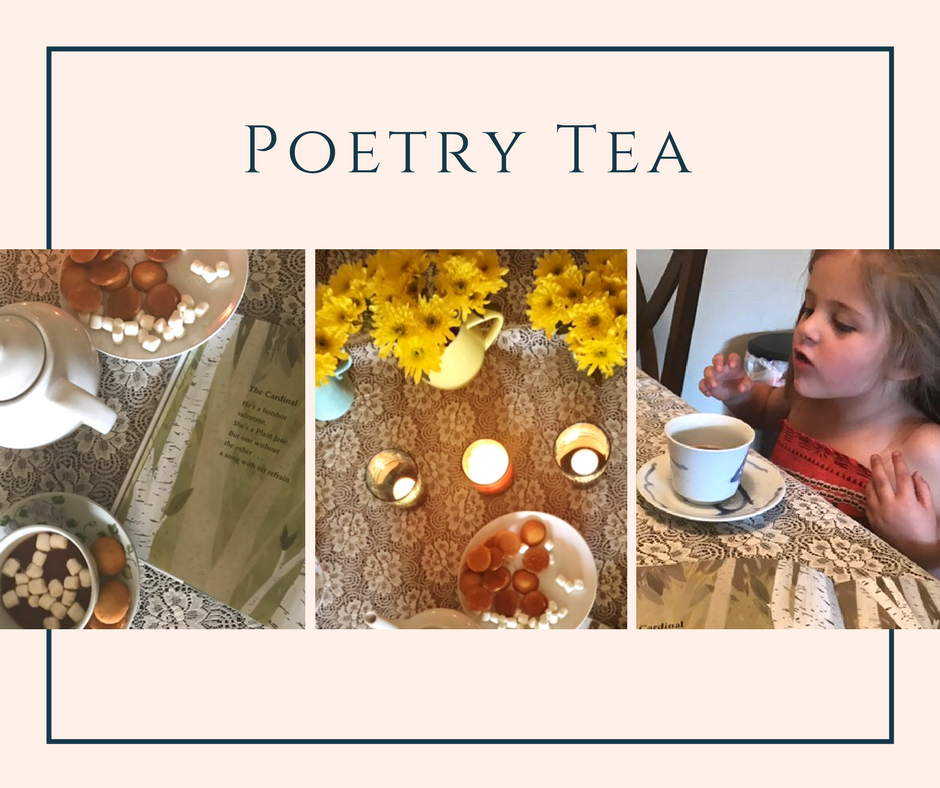
Poetry teatimes were my first introduction to Brave Writer. We embraced this weekly tradition back when we lived on Maui. Since then, we’ve adapted it to fit our mood and the season at hand. All this past summer, our poetry teas were held outdoors, picnic-style on the side of many a Rocky Mountain hiking trail. Last fall, I took some pocket change to our local second-hand store and came home with a delightfully eclectic mix of teacups and saucers, tablecloths and jars for flowers. We try to do a poetry tea every week, and have fun adding themes or surprises when we feel inspired. For instance, we had a “nutcracker” tea party this past December, at night–by Christmas light.
In all honesty, we really have poetry hot cocoas . I’ve tried about ten different kinds of tea with my girls and none have been winners with them yet. And sometimes, they aren’t poetry hot cocoas at all, but “bird guide” hot cocoas or “one more chapter of Little Women pleeeease” hot cocoas. But still.
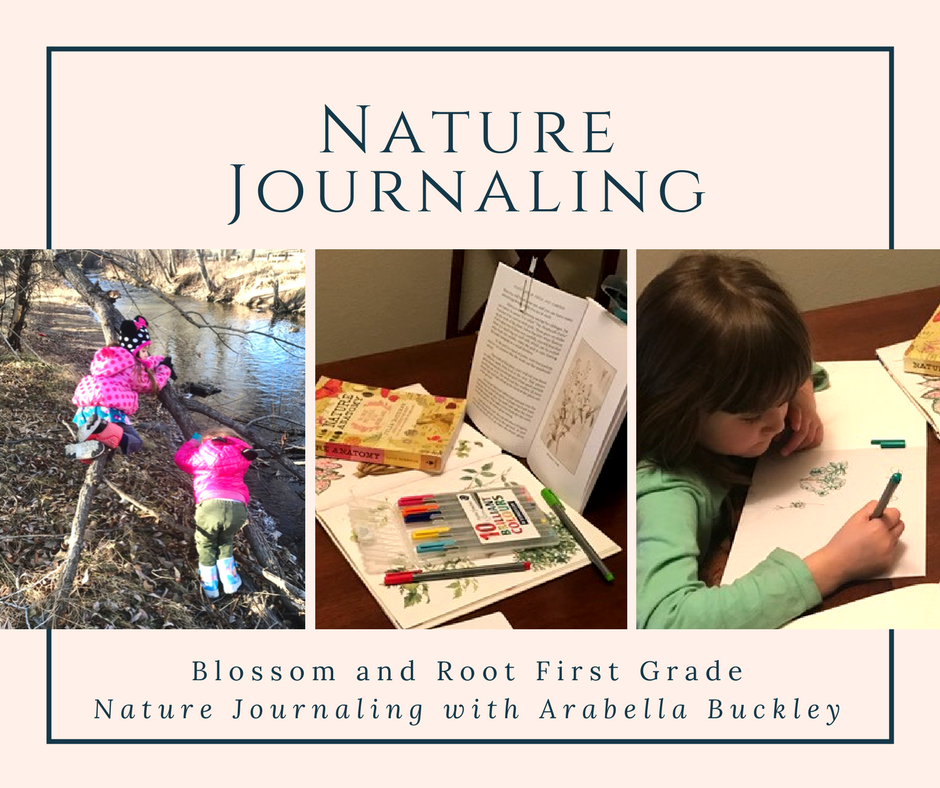
Nature Journaling
Being a nature-based homeschool, nature journaling was already a part of our homeschool lives. But Brave Writer helped me to understand that our weekly scribbles and sketches also counted as writing. As we’ve worked our way through Blossom and Root Early Years , Kindergarten , and now First Grade, we’ve started adding more descriptions to our sketches. The girls will tell me what they noticed and I will dictate their words next to their drawings. This has had a profound effect on their ability to remember things they’ve seen outdoors. Just the other day, Blake said, “mama, this is a ponderosa. I remember because I wrote that the bark smells like candy!”
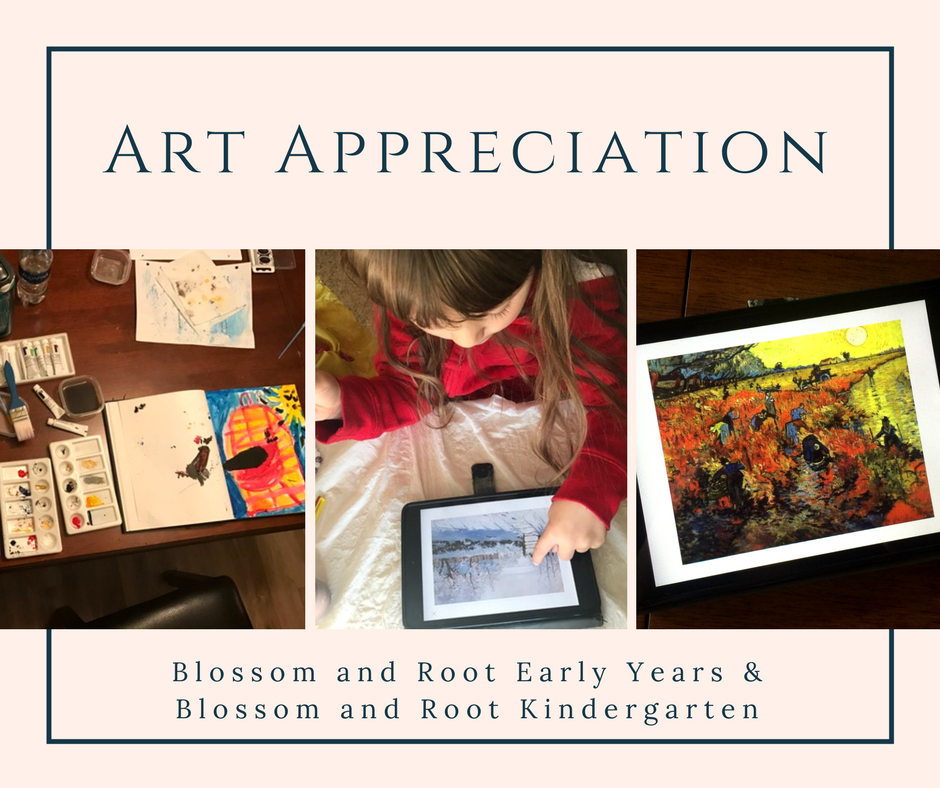
Art Appreciation
Art appreciation is a foundational part of the Brave Writer lifestyle. We do one picture study a week, and at least one art project. These are integrated in the Blossom and Root curriculum . For example, a few weeks ago, we studied The Old Guitarist by Pablo Picasso for picture study, and then made our own free paintings in shades of blue. We also love to do the art museum projects from Jot It Down whenever we get a chance.
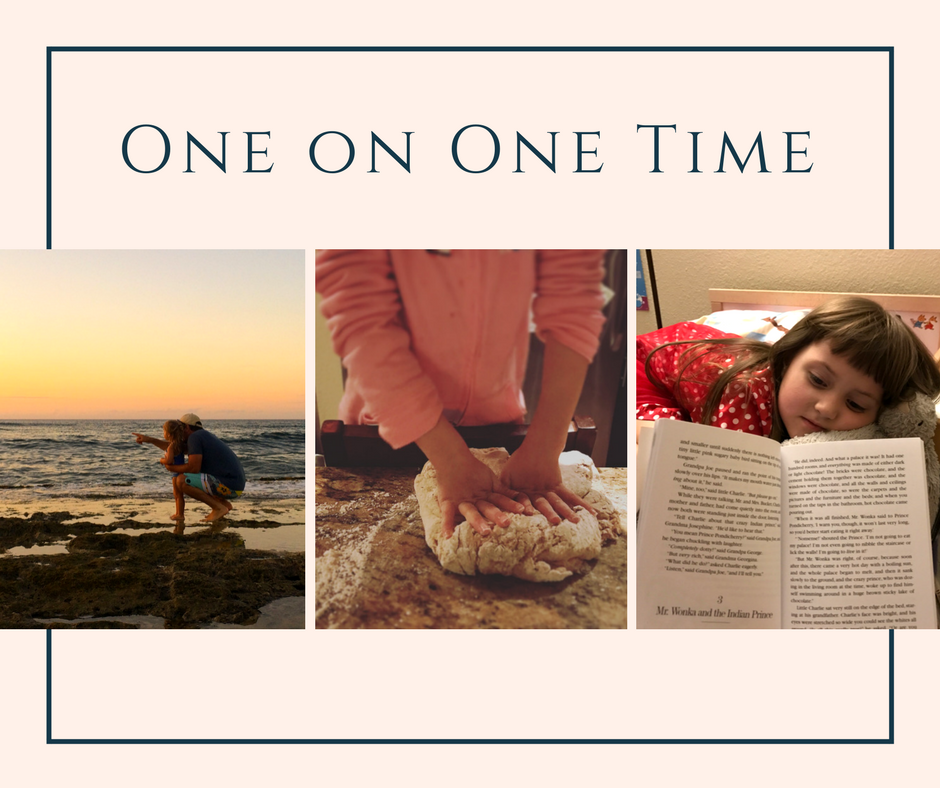
One on One Time
My husband and I try really hard to find opportunities to spend one-on-one time with our daughters. Julie Bogart of Brave Writer often talks about “big, juicy conversations” and these times together are often when the best ones happen. This is especially true of our youngest daughter. She can be a bit quiet in a group, but alone, she blooms into conversation, never failing to stun me with her insights and stories. During one-on-one time, Blake likes to bake bread, snuggle while watching a movie, or do puzzles. Brice prefers outside play, a visit to the playground, or simply a walk around the neighborhood. I learn so much about them when we have alone time together, and am always humbled by their willingness to share their deepest wishes and most important thoughts with me.

Freedom to Change, Grow, and Learn
Julie Bogart and the Brave Writer lifestyle have had a profound impact on our homeschool life, but it’s important to note that this lifestyle looks a little different for every family that participates in it. Most of the questions I get about it revolve around structure. “I don’t really understand which lessons to do on which days.” “How to I make a schedule for this every week? There’s so many pieces!” But Brave Writer isn’t really about plodding along with a strict schedule. And it’s not about “doing” Brave Writer the same way that other families are doing it. It’s about embracing the unique magic of your homeschool .
In a recent blog post, Julie said
Do you know what I feel sometimes when I’m in the homeschool context? Shackles. There is this unwitting need to lock down our homeschool experience under some “rules,” some system that somebody else set up for us…I wish to see people resisting the temptation to define what homeschool should be for another person. Freedom to change, grow, and learn. That’s number one.
To my quietly rebellious little heart, these words were absolute music. I admit it took me a long time to finally, wildly, embrace what the Brave Writer lifestyle meant for us. I kept trying to find that one blogger or Instagram account that could show us what it was “supposed to look like.” Last fall, something snapped into place. I feel like my inner child orchestrated it, honestly, because Brave Writer, our version of it anyway, is really bringing to life the education she craved and sought. I would have been so thrilled to copy beautiful phrases from my favorite books instead of random, redundant, meaningless phrases from our workbooks. I would have loved my teachers to occasionally stop their feedback at, “I love your creative approach to the writing topic” and not add, “Please note all of the (dozens of) red circles where you need to print neater and watch your spelling.” I treasured the rare teachers I had in public school that understood that reading Wuthering Heights and then watching two different movie versions, and having juicy conversations about all of them was indeed a richer education than writing a dry term paper to rehash the plot line.
It’s the idea that theatre and art and movies and games and nature walks are all platforms for language learning– real language learning–and should be embraced as earnestly as any other homeschool task. And brownies. Always add brownies. 🙂
Click on the Links Below For More Information on the Brave Writer Products We Use:
Click here to learn more about Quiver of Arrows
Click here to learn more about Jot It Down
Click here to visit the Poetry Teatime site
Get Your FREE Trial Issue of Book Seeds By Blossom & Root!

This FREE issue, inspired by the book The Three Sunflowers by Janet Lucy, includes two weeks of activities including nature study, STEAM, art project, recipe, and exploring language and poetry. Suitable for ages 3 - 8. Grab yours today!
Almost there! Please check your inbox to confirm your email address.
There was an error submitting your subscription. Please try again.
Kristina Garner
You might also like.
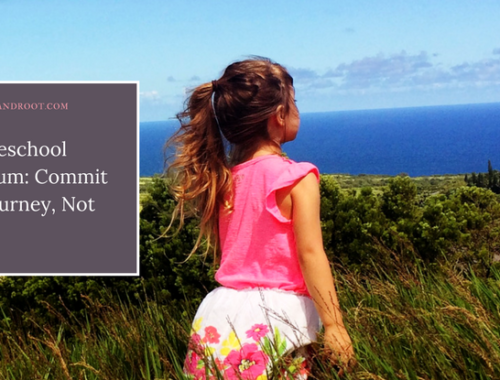
On Homeschool Curriculum: Commit to the Journey, Not the Map
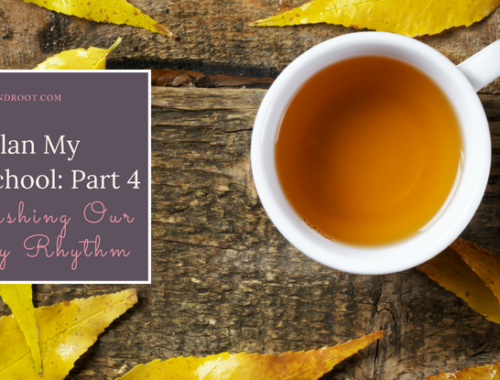
How I Plan My Homeschool Part 4: Establishing Our Weekly Rhythm

How I Teach French in Our Homeschool

Search Bravewriter.com
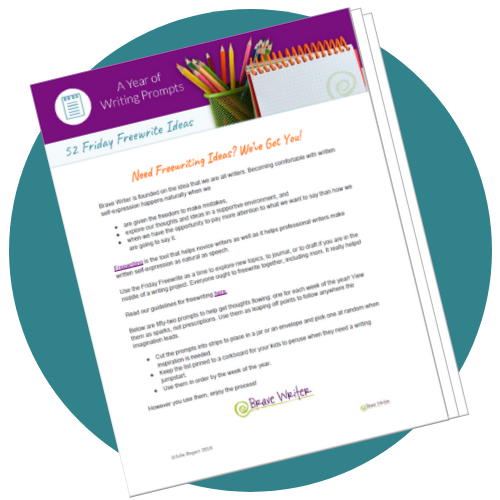
52 Writing Prompts
Need freewriting ideas? We've got you covered!
Here are 52 writing prompts, one for each week of the year!
View them as sparks, not prescriptions. Use them as leaping off points to follow anywhere the imagination leads.
____________________
Note: By submitting this form you're agreeing to receive occasional Brave Writer updates. Please read our Privacy Policy for more information.
- Welcome to Brave Writer
- Why Brave Writer Works
- About Julie
- Brave Writer Values
- Frequently Asked Questions
- Speaking Schedule
- Getting Started!
- Home Study Courses
- Language Arts Programs
- Online Classes
- Brave Writer Lifestyle
- Customer Service
©2021 Brave Writer | Privacy Policy
Look! We're Learning!
Early Learning. Happy Teaching.
Fifth Grade Creative Writing: Brave Writer Review
September 7, 2015 by Selena Robinson 2 Comments
Sharing is caring!
Creative writing is one of the most difficult subjects I’ve ever had to teach in our homeschool . I was an English major in college and I love the writing process, but letting go of what English “should” sound and look like has been a real issue for me personally, so it’s hard for me to teach my kids to write freely.
So I was thrilled to get a chance to post a Brave Writer review after trying the program’s Faltering Ownership for fifth grade creative writing! In fact, I loved Brave Writer so much that it’s going to be our creative writing program for this homeschool year!
Check out our review to see how we used Brave Writer to make creative writing accessible and fun!
*Disclosure: I received access to this resource in exchange for this post. All opinions are my own and I was not required to post a positive review.*
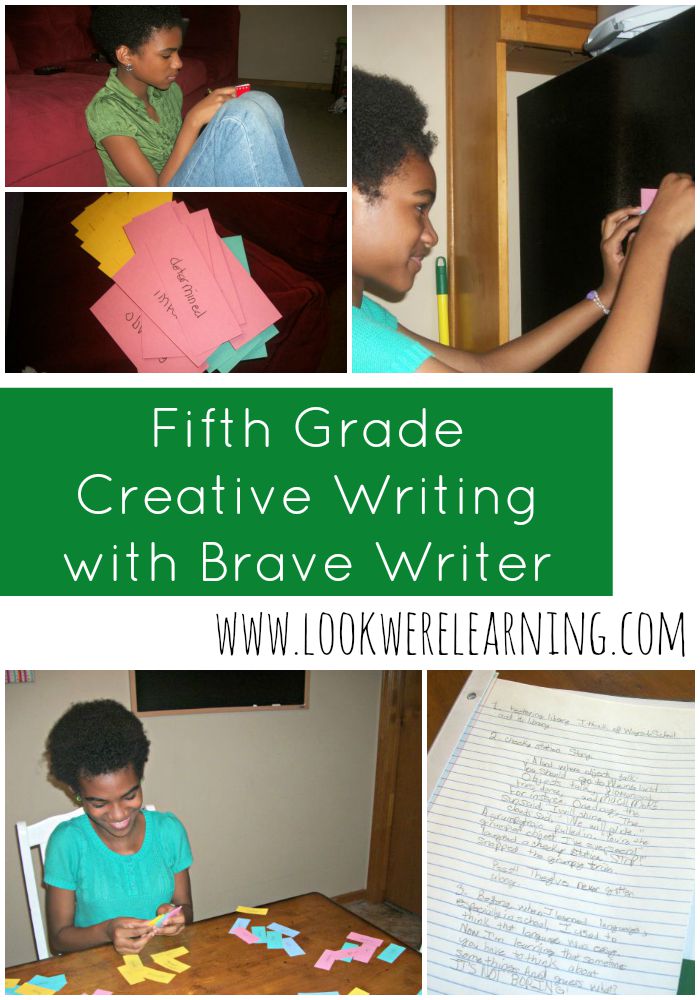
The Faltering Ownership Philosophy
For fifth grade, we used “Faltering Ownership” , the Brave Writer program that’s geared toward 11-12 year olds. I was a little puzzled by the title until I read the introduction to the program, but it turns out that the title fits the program perfectly!
As Julie explains in the intro, middle school is the time when children begin to “take the wheel” of the writing process. It’s kind of like giving your child the keys to the car for the first time and riding in the passenger seat as they drive.
They make turns you’re not expecting and the loss of control can be unnerving for parents, but the experience is essential for kids so that they can take ownership, even if it’s faltering, over their own direction. And Julie applies that analogy to writing.
In middle grades, kids need to develop more confidence in their writing ability. As parents, we shift from teachers to consultants, giving our children direction but also instilling them with confidence to write what they feel. And that means letting them learn to look at language differently.
Once I read the introduction to the program, I had a new outlook on what it means to teach creative writing, even though I’ve already finished a degree in English! So Brave Writer taught me quite a lot as well. 🙂
We jumped right in with the activities in month 1 – Word Collecting and Building.
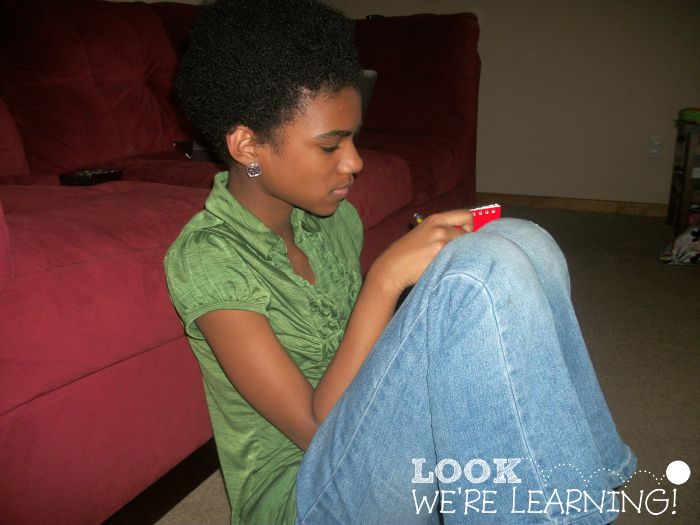
One of the first monthly exercises in “Faltering Ownership” is to collect words and learn to use them as building blocks for writing prompts and expressions. Tigger started off by listening to television shows and conversations, as well as by reading signs, snippets of books that were lying nearby, and product labels in stores.
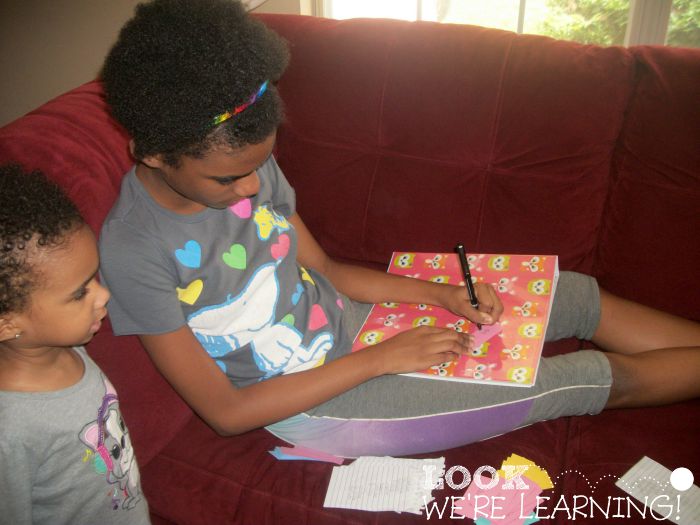
Once she filled several pages of paper with various words, she copied them onto trimmed pieces of index cards.
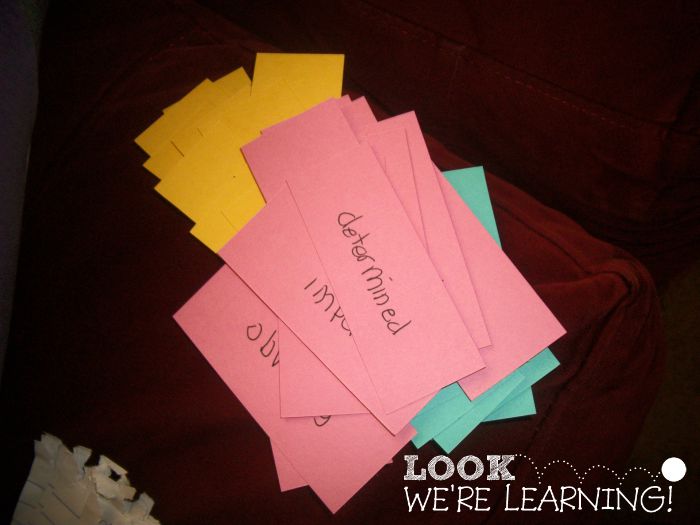
As you can see, we ended up with quite a lot. She really liked collecting those words.
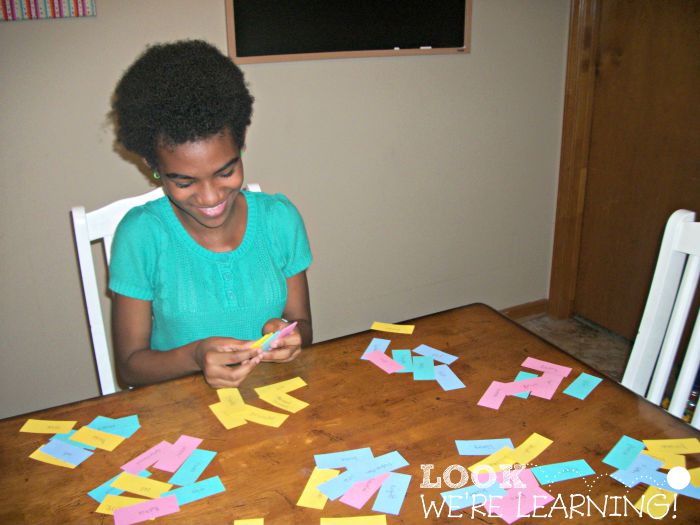
When we had all of our index cards completed, it was time to group the words into piles. In Faltering Ownership, the instructions are quite liberal, so Tigger could group the words however she wanted: alphabetically, adjective/noun pairs, similar topics, or any other way she could think of.
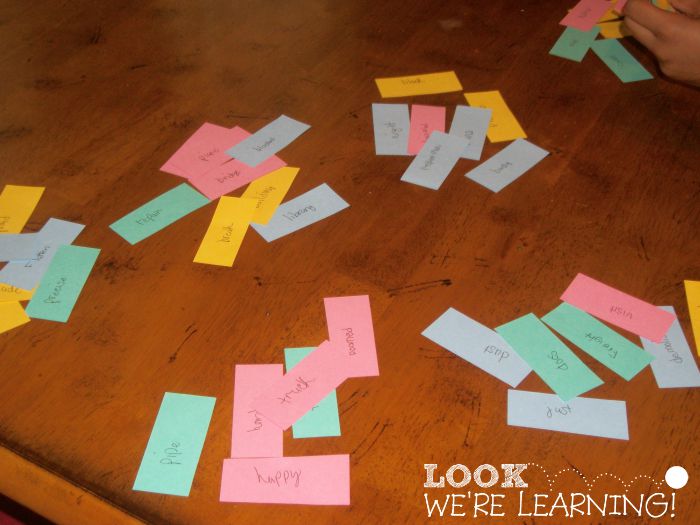
We aimed for about six or seven words per pile.
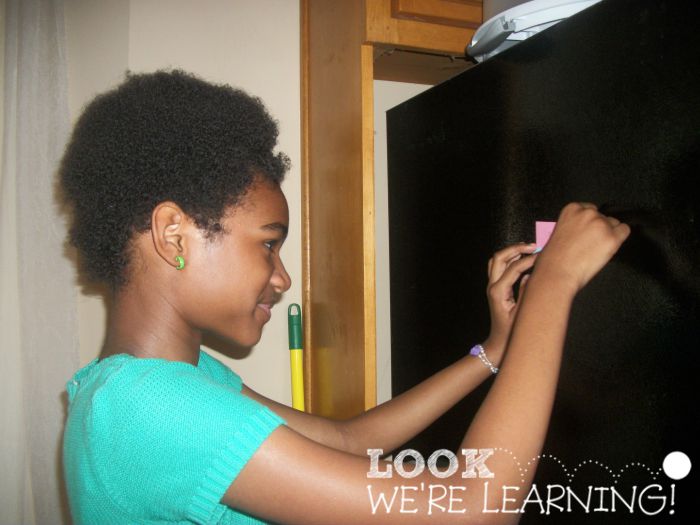
Then she started matching them up to create two-word phrases. Faltering Ownership suggested pasting the words on household objects, so we started with our homeschooling space: the dining room .
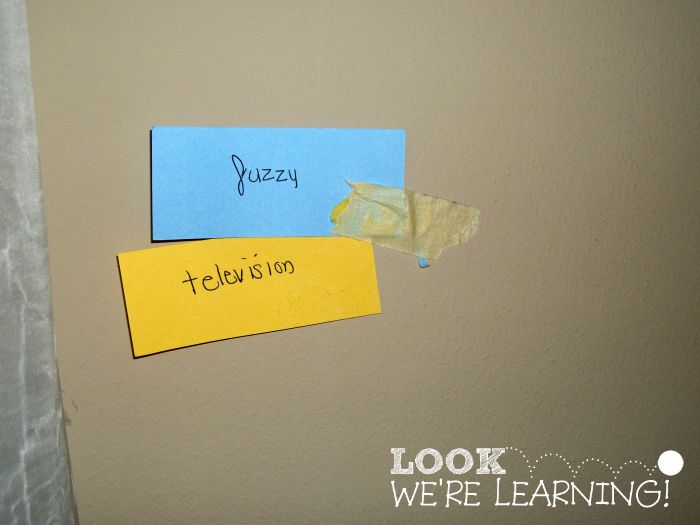
From the random word pairings, we got some great phrases, including “fuzzy television”,
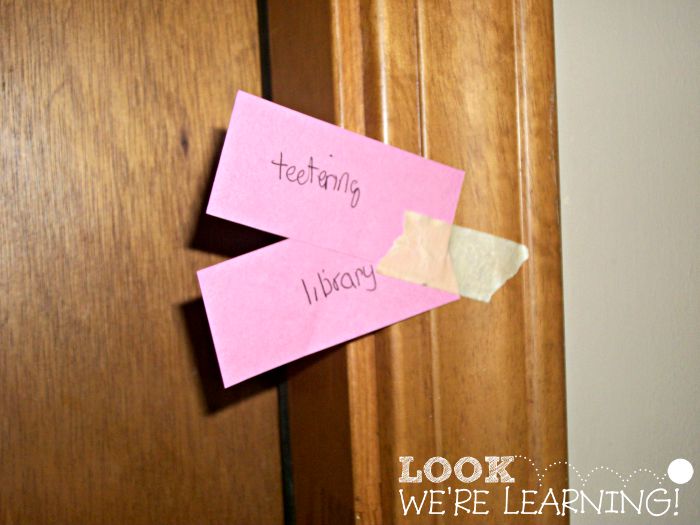
“teetering library”,
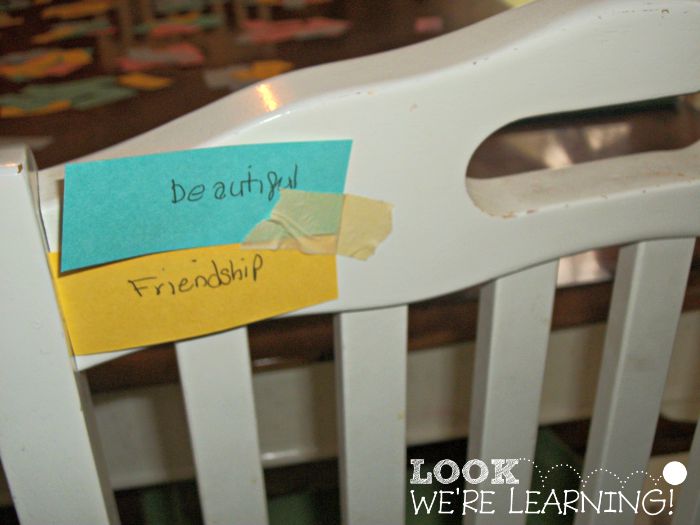
…and “beautiful friendship”. Awww… 🙂
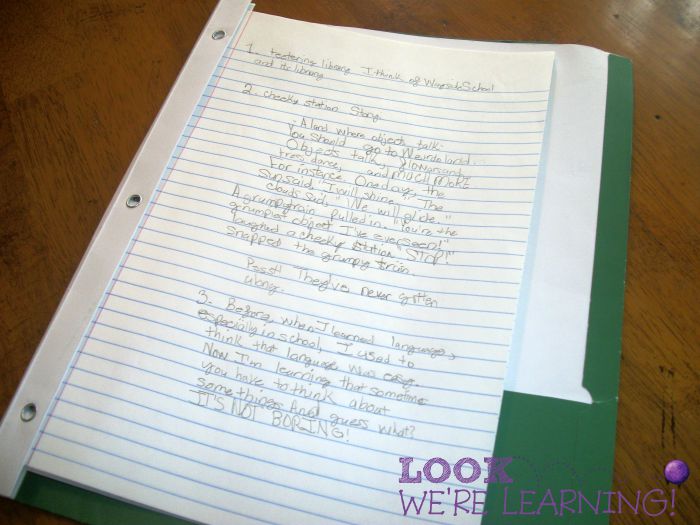
After creating another phrase “cheeky station”, Tigger wrote a short story:
A Land Where Objects Talk
“You should go to Weirdoland. Objects talk, flowers and trees dance, and MUCH MORE. For instance, one day the sun said, “I will shine.” The clouds said, “We will glide.” A grumpy train pulled in. “You’re the grumpiest object I’ve ever seen!”, laughed a cheeky station. “STOP!” snapped the grumpy train. (Psst…they’ve never gotten along.)”
Faltering Ownership recommended asking students how their perspective on language has changed after completing the word building activity. When I asked Tigger, she wrote down her answer:
“Before when I learned language, especially in school, I used to think that language was easy. Now I’m learning that sometimes you have to think about some things. And guess what? IT’S NOT BORING!”
She’s absolutely right. Creative writing is not boring, especially when you can learn to look at words differently and free your mind to use them in new ways.
How to Use Faltering Ownership
Faltering Ownership is designed to be used along with The Writer’s Jungle , the focal point of the Brave Writer curriculum. The Writer’s Jungle is a homeschooling creative writing course that is geared toward parents.
It’s a complete overview of language arts in general – from narration and freewriting to editing and publishing. If you’re unsure where to begin when you’re teaching creative writing, The Writer’s Jungle is basically a guided journey through teaching language arts to your kids.
Since Faltering Ownership is a year-long curriculum, there are exercises for an entire year of creative writing. Naturally, we began with Month 1: Wild Words, but the program continues for 9 months more, covering topics such as historical writing and composing reports. There are also two bonus activities, in case you teach year-round or just want to round out your program with more activities.
Faltering Ownership is based on three core segments: language arts, oral language, and writing projects. One of the things I’m truly enjoying about the program is its emphasis on appreciating language in general before beginning to write. So children can learn to use copywork, narration, and dictation (core components of the Charlotte Mason approach) as keys to examining literature. These are great stepping stones to building their own creativity for what they’ll write later.
Plus, the ebook is beautifully laid out, complete with pictures, diagrams, and prompts. All of the instructions are included for each activity, so you don’t have to be an expert on teaching English before you begin. I can’t tell you how much of a help that was, especially when you’re teaching kids with ADHD and you need to get a lesson done before their attention span goes out the window. 🙂
We can’t wait to use Brave Writer for our fifth grade creative writing program to see how much further we can stretch our writing muscles! If you’re interested in trying Faltering Ownership or another one of the Brave Writer programs, you can save 10 percent on your purchase with the code iHomeschoolDiscount . This code is valid through September 21, 2015 only.
To learn more about Brave Writer, visit the program’s website or keep up with Brave Writer on Facebook , Twitter , Pinterest , or Instagram !
February 7, 2016 at 2:22 pm
Thank you so much for explaining this so clearly. I’m trying to get my head around Bravewriter (which I’m fast falling in love with!). I’m wondering what you did after Faltering Ownership?
Kind regards, Susan
February 18, 2016 at 9:18 pm
Hi! We’re still working with it for the rest of this grade. After this, I’m not quite sure. We may go on to the next level with Brave Writer. I’ll decide sometime over the summer. 🙂
Thanks for stopping by!
Leave a Reply Cancel reply
Your email address will not be published. Required fields are marked *
Save my name, email, and website in this browser for the next time I comment.
- Brave Writer Basics—What Makes Brave Writer Unique
- But What About ________? Common Questions
- More than a Curriculum!—The Brave Writer Lifestyle
- Try Before you Buy: Free Resources!
- Youngest Learners/Early Elementary
- Late Elementary
- Middle School
- High School
- College Prep
- Multiple Children
- Literature Singles
- Grammar and Spelling
- Class Registration
- How do online classes work?
- Begin here!
- High School Transcripts and Credit
- Digital Orders—Where is everything?
- So much information—Help me get started!
- Online Classes—Everything you need to know
- Brave Learner Home
- Social Media
- Other Brave Writer Connections
- Charter School Purchases
- Charter Schools
- Payment Troubleshooting
- Account Management
- Help Center
- Digital Product Consultation: What should I buy?
Growing Brave Writers
Teaches parents healthy writing practices to implement with their children.
Purchase Growing Brave Writers here: Growing Brave Writers
Or as a part of these bundles:
Beginning Writers Bundle
Emerging Writers Bundle
Middle School Writers Bundle
Learn more about teaching Original Thought to your children here:
In Defense of the Writing Process
Brave Writer Writing Process
How Writing is Like Sewing
Natural Stages of Growth in Writing

How to Live the Brave Story You Must Write
Cognitive tools give business artists creative courage..
Posted July 14, 2014
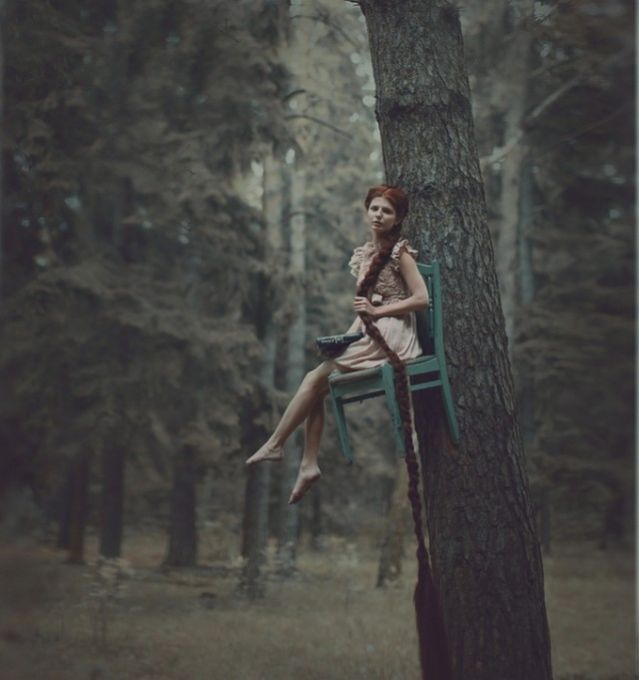
Image: Katerina Plotnikova
"What is your myth–the myth in which you live?”
That’s the question that rattled inside Carl Jung at age 37, months after breaking away from his mentor, Freud . He writes that when he examined the hero stories and myths he had amassed, he held them up like mirrors and wondered about his own life. He wasn’t, as far as he could see, the hero of his own story.
When that voice calls and says, “Look at how you’re living your life. How are you walking the talk?,” most of us reply with, “You’ve got the wrong number,” hang up, and turn up the volume on Downton Abby .
But when Jung got challenged on his own soul stuff, he didn’t hang up. He kept the line open. Listening to that profound doubt prompted Jung to muster the courage to create the Story he knew he must write into and live out.
That's the Story we're talking about.
So let's consider this: A consultant has a book to write. A father has a memoir to write. A journalist has her first young adult novel to write.
Behind every book is a Story. A Story burns inside a writer. And that Story is not the stories that buzz inside her head.
How does she listen to the true voice of doubt beyond the buzz, and how does she muster the courage to create because of that voice?
Those are questions worth living.
Creative courage happens with ordinary choices amidst extraordinary circumstances.
Consider this scenario. "I don't have time to write these days, not even for fifteen minutes," a writer says. Her daughter's ill. Her son has special needs. Her job demands most of her focus when she's not giving it to her ailing mother or children. Her family divides time between a winter home and a summer home, and transitioning to the summer home demands considerable time and toil and prep.
She's smart. She's self-aware.
But the stories that buzz inside our heads have distinct patterns. They often start with "I don't have time to…" or "I can't…" followed by a list of reasons bolstering the stories for why we cannot advance, even incrementally, on the Story we must tell. Those "reasons" seemingly fall into the category of immutable circumstances - what other people demand, the natural disaster that ensued, the ailments and illnesses and aging, our own disposition.
Buzzing stories obfuscate. Buzzing stories bury choice amidst the rationalizations, the seeming circumstances.
If we were to ask this same writer above how else she has chosen to spend fifteen, thirty, even forty-five minutes in a day - despite her many challenging circumstances - she might at first claim she doesn't have time to make a choice. But with gentle re-direction, she might realize she does. She daily makes choices as to which people she's responsible to. The responsibilities she chooses to uphold. The job she chooses to keep to care for her children. The summer home she chooses to transition to. The online articles she chooses to read. The conversations she chooses to have.
No judgment in making any of these choices, but buzzing stories tell you that you have no choice. The voice of your Brave Story reminds you that you have choices to be brave with your time every single day. If you can see the choices you daily make in responding to circumstances, maybe you can start to make more intentional choices to write the Brave Story you must tell.
Devote yourself to your Brave Story.
Here's another way of viewing the stories versus the Story you must tell:
What are you devoted to?
It's a scary question, the kind that woke up Jung. It's scary because it shows up in your choices.
Your choices show you're devoted to your kids. Your job. Your livelihood. And you make good choices accordingly. No judgment.
But devote yourself to your Brave Story, too. Let your daily choices for how you act, speak, and imagine show it. My pal Jen Louden elaborates on a practice I do every morning along these lines and that we do at the author's intensive Your Brave New Story as well. What are you devoted to? Reply in the comments below.

Create with integrity, not in battle.
Our life is a battle between "writing my book" and "the rest of life" if we make it that way. Buzzing stories will make it that way. No wonder buzzing stories breed resentment, self-defeat, and learned powerlessness.
I wrote The Compass of Wonder as a set of reminders to keep business artists, professionals, and artists "on-track" with what matters amidst inevitable challenge and distraction. One of those reminders is, "Create in integrity, not in battle. The rest of your life outside of your creative project is part of your creative quest, too."
"You mean," someone asked me recently, "that my creative quest includes all of that stuff?" All of it .
You're not supposed to know everything about writing or Story Architecture.
A corporate consultant wants to write a children's book. She's drafted parts of it. But she recognizes her limits in knowledge.
She also, by the way, has two ailing parents and with shifts in the economy has met with hard times. Still, she didn't succumb to the buzzing stories.
Buzzing stories tell us not only that we don't know what we're doing, but also that we're dumb and fooling ourselves. That we should've figured out this writing thing in college.
That our MFA or the fact that we're a professor or professional or published author already means that we should "get" Story Architecture–the art of shaping and sequencing a captivating story–by now.
What bunk that buzz is.
That buzz sends you into a soldier-like mentality of "Do It Yourself"-dom. Or "Figure-It-Out-Yourself"-dom. FIOY might also stand for Fatiguing, Isolating, and Overwhelming Yourself.
When you hear that buzzing story of self-doubt, replace it with curiosity about what you can learn. List the skills you want to learn. Then find the models and mentors to help you learn them.
For the corporate consultant, we laid out the skills and attributes of children's books she wanted to cultivate. We quickly identified seven traits of writing well-suited to her disposition, intention, and audience. Then we found mentor books for her to study for express purposes.
There is joy in cultivating an Apprentice's Mindset. You get to step into the wizard's lab of Story-making.
She attended Your Brave New Story last year and now has a bank of Story Architecture knowledge to draw from as well. She also recently landed a seed investor for her media project in part because she has learned how to speak with integrity about the Story of her business.
The voice of her Brave Story reminds her that she can learn , that the middle-aged brain loves to learn, and can learn deeply - more so than many of the younger, speedier processors.
Leave the Waiting Room.
Your time to write your Brave Story does not begin when the semester is over and summer starts. When the teenager leaves for college. When the aging parent stops aging. When you get healthy. When your business is stable.
One June, a late-night phone call called me away from my wife and daughter for a few weeks to tend to my father who had fallen, broken his hip, and was found straddled on his living room floor, out of reach of the phone, near- unconscious for 6 days. A weak immunity and a weakened memory coupled with the hospital's unhealthy environment worsened his condition. Each day I futilely tried to navigate the labyrinths of medical care and hospitals and assisted living units while my father vacillated between holding on and wanting to go.
At one point, even with his fading memory, his sad eyes caught mine, and he said, "Jeffrey, I don't want you to be here. You have the rest of your life to live." But I was living it then. Every day. Being with him was part and parcel of this quest.
And every morning I ran alongside the Trinity River and wept. And then I wrote. Because I had to. Because it burned in me. Because we just don't have much time. Because the Waiting Room is not a place to live. Because the Waiting Room is a place where something true and brave in us can die.
Stop listening to the voices buzzing inside your head.
Stand up for the Story that burns inside your body.
Be brave (Here's a poem-film I and my videographer collaborator created).
You'll give the rest of us courage to do so, too. And that's no small gift.
How does what I offer here resonate or land with you? Add to the conversation below.

Jeffrey Davis, M.A. is a business consultant and author of Tracking Wonder: Reclaiming a Life of Meaning and Possibility in a World Obsessed with Productivity.
- Find a Therapist
- Find a Treatment Center
- Find a Psychiatrist
- Find a Support Group
- Find Online Therapy
- United States
- Brooklyn, NY
- Chicago, IL
- Houston, TX
- Los Angeles, CA
- New York, NY
- Portland, OR
- San Diego, CA
- San Francisco, CA
- Seattle, WA
- Washington, DC
- Asperger's
- Bipolar Disorder
- Chronic Pain
- Eating Disorders
- Passive Aggression
- Personality
- Goal Setting
- Positive Psychology
- Stopping Smoking
- Low Sexual Desire
- Relationships
- Child Development
- Self Tests NEW
- Therapy Center
- Diagnosis Dictionary
- Types of Therapy

Sticking up for yourself is no easy task. But there are concrete skills you can use to hone your assertiveness and advocate for yourself.
- Emotional Intelligence
- Gaslighting
- Affective Forecasting
- Neuroscience
Search Bravewriter.com
A brave writer's life in brief, thoughts from my home to yours, sneak peek: growing brave writers.
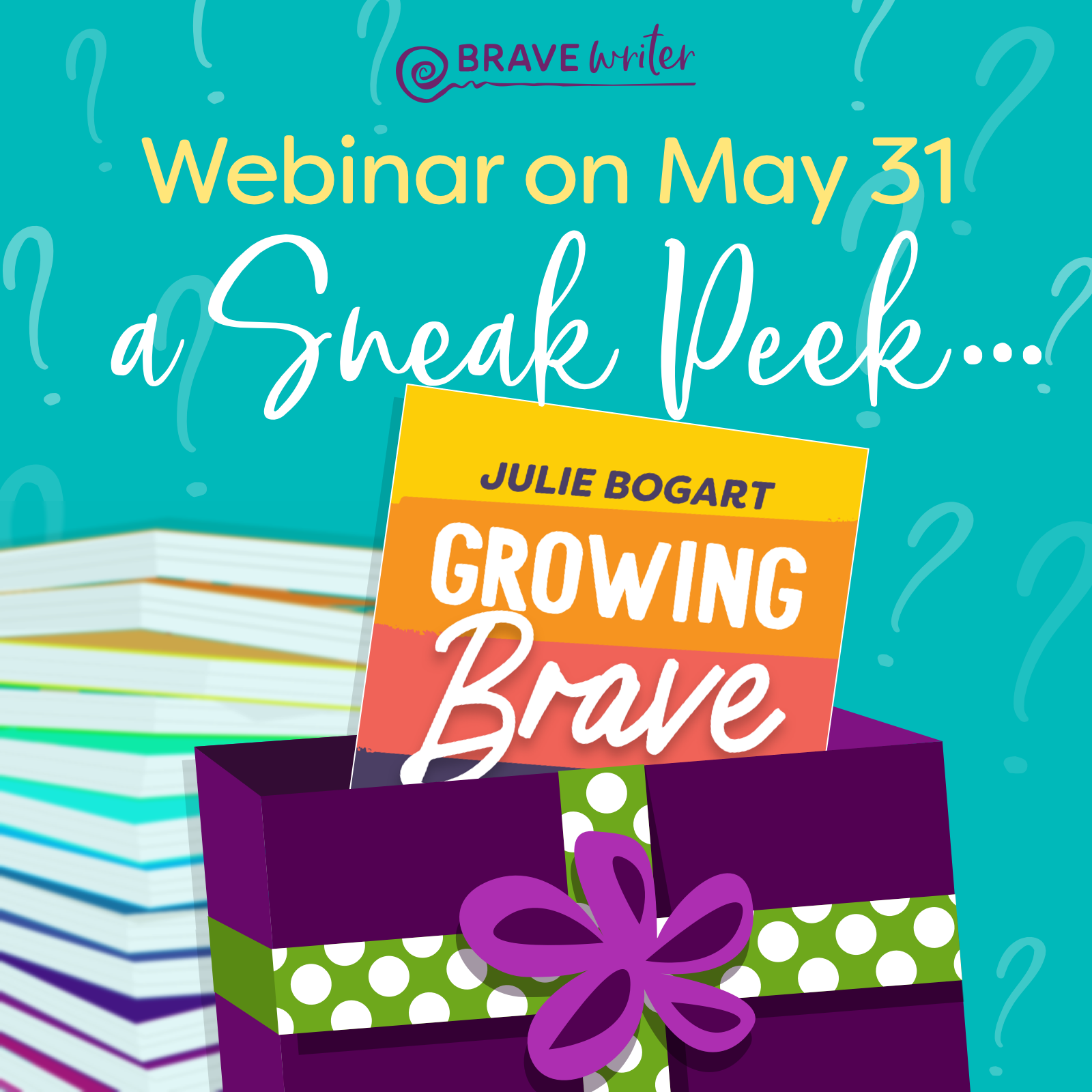
I’ve got a brand new writing manual for you and I can’t wait to tell you about it. Sign up for a webinar where I walk you through all the new wonderful features.
Sign up here .
Growing Brave Writers is the essential training you need to be the delightful writing coach your children deserve. Implement specific practices and activities that release the writer within your child. End writer’s block!
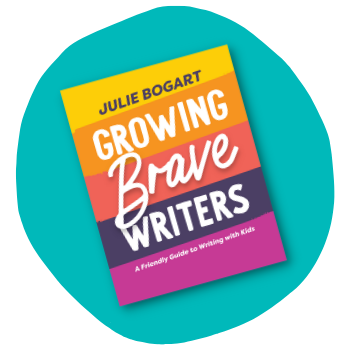
Together, you and your kids will:
- grow a rich vocabulary
- do research
- polish fiction and nonfiction writing
Each chapter contains :
- A coaching guide for a writing practice
- A writing activity with detailed instructions
- A checklist for completion
- A sample written narrative of skills mastered
An appendix features :
- Writing samples for the activities
- Directions for how to use the program in co-ops and schools
- A planning model to apply to your calendar
Most programs tell students what to write. We show them how to write.
Nearly a quarter century of breakthroughs in writing with tens of thousands of students from all over the world—this program works!
PRE-SALES open on JUNE 1, 2022.
Growing Brave Writers is a 200+ page PDF file. It’s non-consumable, and applies to students of all ages (5–18). It supports a writer doing any kind of writing, including assignments in other programs or classes, for homeschooled and traditionally schooled students.

This entry is filed under BW products . You can follow any responses to this entry through the RSS 2.0 feed. Both comments and pings are currently closed.
Comments are closed.
Search the Blog

Welcome, I’m Julie Bogart.
I’m a homeschooling alum -17 years, five kids. Now I run Brave Writer, the online writing and language arts program for families. More >>
IMPORTANT : Please read our Privacy Policy .
New to Brave Writer? START HERE

Popular Posts
- You have time
- How writing is like sewing
- Best curriculum for a 6 year old
- Today's little unspoken homeschool secret
- Do you like to homeschool?
- Don't trust the schedule
- You want to do a good job parenting?
- If you've got a passel of kids
- You are not a teacher
- Natural Stages of Growth in Writing podcasts

FREE Resources
- 7-Day Writing Blitz
- Brave Writer Lifestyle Program
- Brave Writer Sampler: Free Sample Products
- Freewriting Prompts
Brave Writer Store

Blog Topics
- Brave Learner Home
- Brave Writer Lifestyle
- Contests/Giveaways
- Friday Freewrite
- High School
- Homeschool Advice
- Julie's Life
- Language Arts
- Movie Wednesday
- Natural Stages of Growth
- One Thing Principle
- Philosophy of Education
- Poetry Teatime
- Speaking Schedule
- Writing about Writing
- Young Writers

- Brave Writer is a participant in the Amazon Services LLC Associates Program, an affiliate advertising program designed to provide a means for sites to earn advertising fees (at no extra cost to you) by advertising and linking to amazon.com Content © Brave Writer unless otherwise stated.
244. Middle School Writers: Natural Stages of Growth in Writing #3 Brave Writer
Welcome to our third episode in our Natural Stages of Growth in Writing series! Today we cover the Middle School Writers stage, which typically occurs around ages 9-12. This stage is all about building confidence, instilling in your student that they can consistently express themselves well in writing. We dive into freewriting practices—generating ideas and writing in short spurts. We also walk through how to do low-stakes revisions to help kids get comfortable with messing with their writing after it is on the page. We also talk about non-writing activities students can do that contribute to their writing skills. Resources: Start a free trial of CTCmath.com to try the math program that’s sure to grab and keep your child’s attention.Sign up by the end of July for the Brave Writer TrainingHere’s our free Summer Games Guide Check out the Middle School Writers Bundle Learn more about our Building Confidence projectsBuy the Building Confidence Bundle Check out our list of Tools for the Art of WritingSign up for Brave Writer Summer CampView all the Brave Writer BundlesSign up for our Text Message Pod Ring to get podcast updates and more!Send us podcast topic ideas by texting us: +1 (833) 947-3684 Connect with Julie: Instagram: @juliebravewriterThreads: @juliebravewriterTwitter: @bravewriterFacebook: facebook.com/bravewriter Connect with Melissa: Website: melissawiley.comSubstack: melissawiley.substack.comInstagram: @melissawileybooksTwitter: @melissawiley Produced by NOVA Media
- Episode Website
- More Episodes

IMAGES
VIDEO
COMMENTS
The first act of bravery is writing the first word of your story. Choose a starter and add your thoughts. Let the words flow, the flow will take you far in your writing journey. Forget about punctuation, spelling, and grammar — just write — get it down. Then, when you have a jumble of thoughts written out, go back, edit, rewrite, and edit ...
Explore your thoughts and feelings about this moment in your life, focusing on how it forced you to confront and demonstrate your bravery. Write a narrative recounting this event, examining your emotions, reactions, and the aftermath. Bravery Through Others' Eyes: We often perceive ourselves differently from how others perceive us.
Online Classes. We've been teaching writing online since before it was cool—23 years! Over 30,000 students have studied with us from 191 countries! Classes are 3-6 weeks long. Choose what works for you! No secret add-on costs. No special software, books, or video. Classes enroll and run on a rolling basis.
Volume 1 - Embracing Bravery as a Writer — Words for the Writer's Soul Magazine. Magazine. Words For the Writer's Soul Magazineis a free quarterly publication fromFor the Writer's Soul, where our goal is to support, inspire, and walk alongside writers from around the world. Our tools and resources are designed to nourish your soul and ...
Meaningful ways to learn grammar, spelling, and punctuation. If this way of homeschooling speaks to you, check out our Brave Writer programs: Quill (ages 5-7), Dart (8-10), Arrow (11-12), Boomerang (13-14), Slingshot (15-18). On sale through the end of June. Sale includes a free lifetime membership to Brave Learner Home.
Brave Writer Curriculum Guide Overview. Our family began our literature studies using the Brave Writer Arrow Guides. We used one guide a month and followed the four-week plan for each book. The Brave Writer Arrow and Boomerang Guides are each divided into four weeks of instruction. Each week contains: 1. Weekly Copywork
The writing project, which investigates a specific literary element, takes an additional day on the fourth week only. Freewriting. The Brave Writer lifestyle leaves LOTS of room for freewriting, and encourages ample doses of it. My oldest daughter is naturally drawn to writing, and (like her mama) can never get her fill of it.
52 Writing Prompts. Need freewriting ideas? We've got you covered! Here are 52 writing prompts, one for each week of the year! View them as sparks, not prescriptions. Use them as leaping off points to follow anywhere the imagination leads. _____ Note: By submitting this form you're agreeing to receive occasional Brave Writer updates.
The elementary years are full of creative ideas and delightful scenarios! Wild plots, crazy characters, and surreal elements abound in the imagination of a child. ... Brave Writer® 101: Guided Writing Process Aug 26 - Oct 4, 2024 Brave Writer® 102: Learning to Revise Oct 14 - Nov 8, 2024 Write for Fun: Dream Big Nov 18 - Dec 10, 2024.
Freewriting is that wonderful key that unlocks the writer within. It's the vehicle by which we trick our inner selves into divesting the words and ideas that we want to share but are afraid won't come out right on paper if we do. So, read the prompt above, set the timer for 5-10 minutes then write whatever comes to mind.
If your child is new to creative writing, this is the right class. It's a game-changer for your child's confidence in this genre! While your kids are having fun, they're also gaining richer vocabulary, flexible thinking, and a breezy introduction to formats and poetry! This class boasts. Manageable workload, plus a little structure.
Brave Writer 101 covers much of the same material found in Growing Brave Writers.. Once you have completed Brave Writer 101, the next step is Brave Writer 102: Stress-free Revision. This class breaks through any resistance to writing and invites playful experimentation with an original draft that brings joy to the process of revision rather than tears!
I help creative, intuitive women who have always wanted to be writers step into their author identity and start, finish and publish brave, dazzling books. My debut novel Catchlight won the Fairfield Book Prize, was named a Best Indie Book of 2020 by Kirkus Reviews, and was featured on Good Morning America's blog.
Speaking Topics. Creating Your Pleasure-Packed Writing Routine: Use Your Personality to Supercharge Your Writing Habit. Healing Creative Wounds: Dissolve Writer's Block and Open Up to Flow Intuitive Writing: Access Your Inner Wisdom to Channel Your Book The Art of Revision. Publishing Pathways: How Traditional, Self- and Hybrid Publishing Really Work. My Publishing Experience: 13 Years in ...
Fifth Grade Creative Writing: Brave Writer Review. We jumped right in with the activities in month 1 - Word Collecting and Building. One of the first monthly exercises in "Faltering Ownership" is to collect words and learn to use them as building blocks for writing prompts and expressions. Tigger started off by listening to television ...
Growing Brave Writers is the centerpiece of the Brave Writer program, designed to teach you how to implement healthy writing practices with your kids. You will learn how to become your children's best ally in their writing journey and how to support and coach the process without burning out. Moreover, your children will learn a working method ...
In Brave Writer, we divide writing into three categories and design products and classes accordingly. Original Thought (grown through the writing process) Mechanics (taught through literature) ... Go Wild gives kids a chance to enjoy writing—a 3-week romp through creative writing that focuses on content over mechanics. Perfect for kids 9-14.
Because the Waiting Room is a place where something true and brave in us can die. Stop listening to the voices buzzing inside your head. Stand up for the Story that burns inside your body. Be ...
PRE-SALES open on JUNE 1, 2022. Growing Brave Writers is a 200+ page PDF file. It's non-consumable, and applies to students of all ages (5-18). It supports a writer doing any kind of writing, including assignments in other programs or classes, for homeschooled and traditionally schooled students. This entry is filed under BW products .
Supports creative writing: Brave Writer was often mentioned as a program that encourages creative writing and helps students explore their imagination and personal voice. 4. Offers flexibility and adaptability: Parents appreciated the flexibility of Brave Writer, as it can be adjusted to suit individual learners' needs and interests. ...
Welcome to our third episode in our Natural Stages of Growth in Writing series! Today we cover the Middle School Writers stage, which typically occurs around ages 9-12. This stage is all about building confidence, instilling in your student that they can consistently express themselves well in writi…
Creative writers make art. The study and practice of creative writing teaches you to read and write like a writer.In this program, you'll learn the strategies and techniques that professional writers use to create stories, novels, poems, screenplays, and other media and creative forms.
Our Creative Poetry Writing Workshop will help you find your own style to write poems that are full of feeling! By Nova New Opportunities. Follow. Follow. Date and time. Wed, 3 Jul 2024 10:30 - 11:30 GMT+1. Location. Nova New Opportunities. 2 Thorpe Close THORPE CLOSE LONDON W10 5XL United Kingdom.
An Online Writing or Language Arts Class. Brave Writer classes are a good idea for you or your children if you would appreciate the structure, support, feedback and accountability of working with an instructor. Parents who feel they routinely fail to "get writing done" do better in classes than with "one more manual" sitting in a bookcase.
CWL 500-S01 - 95360 - Intro to Graduate Writing: Christian McLean. Wednesday, 5:30-8:20 PM. Part ethics, part studio, part special guest appearances and craft conversations, this course is designed to get you thinking about how you would like to exist in the creative world, both in this program and beyond.
Getting Started with Brave Writer. To grow great writers, all you need is love—for that quirky, insightful, brilliant mind that lives inside your kiddos; and a little help—a few tools to demystify the writing process. Your kids are already writers. The moment little Tanya said "Mama" and you scribbled it into the baby book, a writer was ...
Veterans also may submit creative writing to include essays, poetry, and short stories. Registration week for all categories is 10 a.m. to 3 p.m. daily, July 22-26, in Bldg. 131, Room 101 (Activity Room), on Lovell FHCC's North Chicago campus. Artists and creative writers also will drop off their submissions during this time.
Growing Brave Writers is a 200+ page black and white PDF file. It's non-consumable, and works well with students of all ages (8-18). It's designed to support a writer doing any kind of writing, including assignments in other programs or classes, for homeschooled and traditionally schooled students. All products are digital and downloadable.